Leadership
Board of Directors
The GCC is led by our executive director and volunteer board of directors. We come from varied walks of life and professional backgrounds. Each member contributes a broad range of skills, knowledge, and perspectives to the GCC, its programs, and its strategic direction.
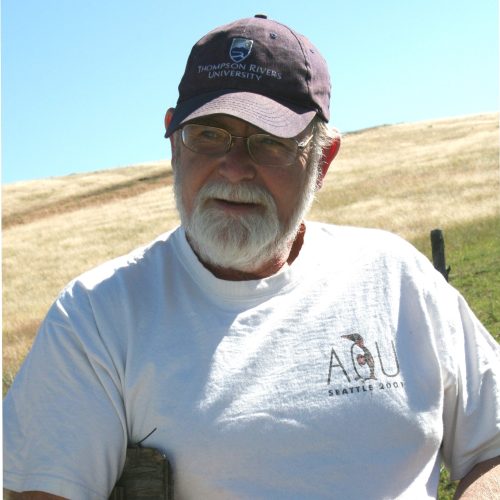
Dr. Tom Dickinson, Chair
Kamloops
Dr. Tom Dickinson is an Emeritus Professor of Biology at Thompson Rivers University (TRU), and he has extensive experience in strategic planning and program development.
Tom came to Kamloops in 1989 to be part of the growth of TRU, and he became the first Associate Vice President of Research in 2003. In this position, he helped develop the Canada Research Chair and Leading Edge Endowment Fund Chair programs, and led the TRU Advanced Technology Centre, which helped connect the local community to the resources and services of the university. He is the current President of Venture Kamloops, which promotes economic opportunities and business investment in Kamloops
Tom has always been interested in the behaviour and ecology of animals, principally birds, and for many years he has taught a broad range of courses in wildlife biology, conservation biology, and evolution. He has served on the executive of the Society of Canadian Ornithologists for over a decade and he represented the Federation of BC Naturalists in the Kamloops LRMP planning process.
Tom was involved in the creation of the Grasslands Conservation Council of British Columbia in the 1990’s, and he has had a life-long passion for the wise stewardship of BC’s grasslands.
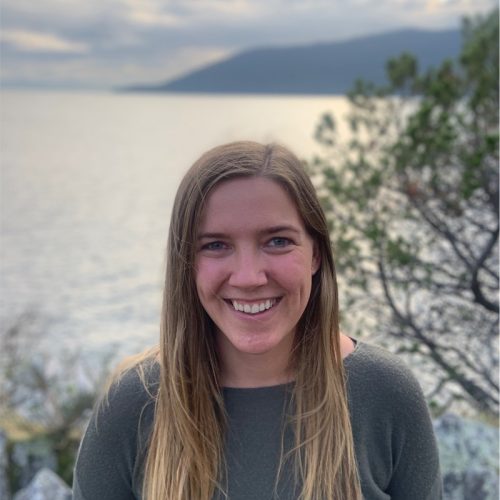
Heather Richardson, Vice Chair
Kamloops
Heather Richardson is a Registered Professional Biologist with the Government of BC. Her current projects include ecosystem mapping and wildlife inventory data management.
She became passionate about grassland ecosystems while completing her Master’s of Science at Thompson Rivers University in 2013 -2015. During this time, she travelled through the diverse and beautiful grasslands of BC studying the mechanisms that affect soil carbon storage in grazed and non-grazed grasslands in BC.
Since then, her love for grassland ecology and conservation has continued to grow. She enjoys working on restoration and outreach projects with the GCC.

Dennis Lloyd, Treasurer
Kamloops
Dennis is a research ecologist with over 30 years of experience with the BC Forest Service. He played a key role in developing the Biogeoclimatic Ecosystem Classification (BEC) and in using it to map the former Kamloops Forest Region. He published field guides and maps, and spent countless hours training natural resource managers and university students about BEC principles and their application.
During his time with the BC Forest Service, Dennis contributed to numerous silviculture projects aimed at improving forest regeneration and our understanding of plant succession following timber harvesting. In the 1990s Dennis co-authored the field guide, Plants of Southern Interior British Columbia, and he was the Chair of a multi-disciplinary technical team that contributed to the protected area strategy in the Kamloops, Okanagan-Shuswap, and Lillooet Land and Resource Management Plans.
Dennis was a co-founding member of the Grassland Conservation Council of British Columbia in 1999 and served on the inaugural Board of Directors until 2007. He recently returned to the Board of Directors and is a key contributor to the Priority Grasslands Initiative and the development of management plans for the Laurie Guichon Memorial Grassland Interpretative Site.
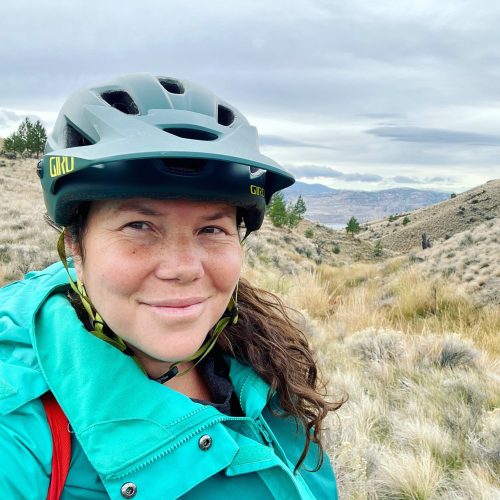
Mandy Ross, Director
Kamloops
Mandy is a plant ecologist specializing in habitat assessments and ecological monitoring. She has recently completed contracts for the BC Conservation Foundation, BC Parks, and forestry consultants based in Kamloops. Mandy developed a special interest in grasslands while completing graduate research on the Lac du Bois grasslands in 2016 at Thompson Rivers University.
Before moving west in 2007, she was a forest technician with the Grand River Conservation Authority in Ontario while completing her undergraduate degree at the University of Guelph. During this time, she also completed volunteer work in Nepal, Bolivia, and Guatemala.
Mandy has a passion for public education and outreach. She has been the WildSafeBC Community Coordinator for the Thompson-Nicola region and a leader of NatureKids BC activities. This has involved coordinating public events, preparing communication materials, media liaison, and making presentations in schools and to public groups.
Mandy enjoys as much camping, biking, hiking, skiing, and rock climbing as her young family will allow. She appreciates the beauty and importance of grassland landscapes and has spent many hours observing these unique ecosystems.
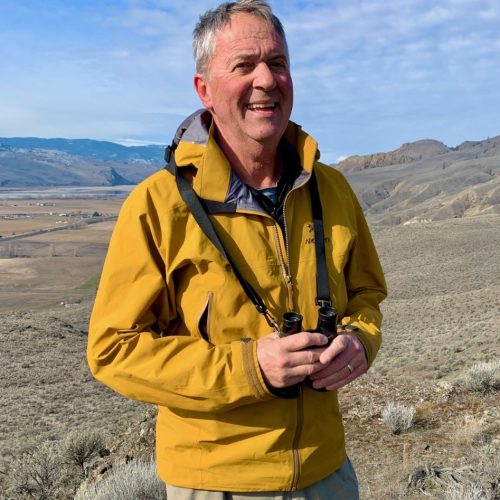
Ian Barnett, Director
Kamloops
Ian has been involved in land and water conservation across Canada for 40 years, over 25 years of which in BC’s Interior. He’s been a member of numerous national and international boards and committees concerned with the conservation and stewardship of important natural habitats. He brings to the GCC extensive experience in the development of program partnerships and in ensuring the financial health of NGOs.
After retiring from Nature Conservancy of Canada in 2017 as VP of Regional Operations, Ian served on NCC’s BC Board of Directors as well as on the board of the Canadian Roundtable for Sustainable Beef which goal is to enhance sustainability in the beef industry from the land to the consumer. Ian was also a member of an expert committee for the Canadian Land Trust Alliance to revise standards and practices for use by over 75 Canadian conservation organizations. He retired from Ducks Unlimited Canada in 2011 after 31 years with his last position Director of Regional Operations for the Western Region. He was responsible for DUC’s conservation, education, and fundraising in Canada’s western provinces, the Yukon and Northwest Territories.
Ian previously served on GCC’s board in the early 2000s and has remained a long-time supporter. He enjoys outdoor recreational activities such as skiing, hiking, biking, and birding, particularly in the grasslands of the Thompson-Okanagan region.
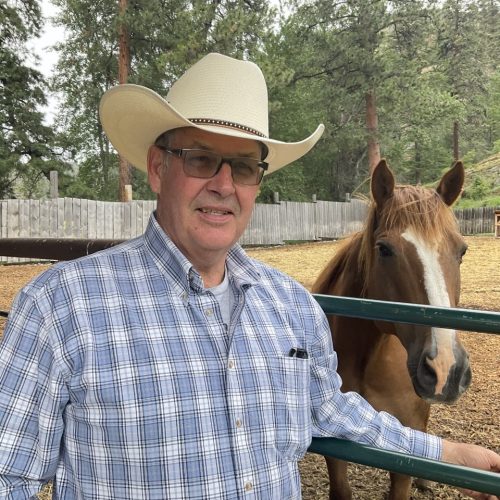
Brian Thomas, Director
Okanagan Falls
Brian is a third-generation rancher, and his family has been ranching in Okanagan Falls for over 100 years. He is a Director for the BC Cattlemen’s Association, a Director for the South Okanagan Stockmen’s Association, and he was previously a Director for BC Livestock Producers Co-operative Association.
In 2000 his family sold a large portion of their ranch to The Nature Trust of British Columbia, to protect the land from development and to have it continue as a cattle ranch. They now lease back the ranch, and currently run 200 cow/calf pairs and sell their excess hay. On the land that wasn’t sold, they lease a portion to Arterra Wines Canada for a vineyard. Brian also runs an organically listed compost operation, using cattle bedding and grape pomace from local wineries.
Brian is very interested in the grasslands of our province because, as a rancher, he knows how much the ranching industry relies on these grasslands to raise cattle. Without healthy grasslands we don’t have a healthy ranching industry.
The grasslands of the province have come under a lot of pressure in the last few years, such as housing subdivisions and increased recreational use, and in the South Okanagan, increased pressure from other types of agriculture, such as vineyards, wineries and orchards.
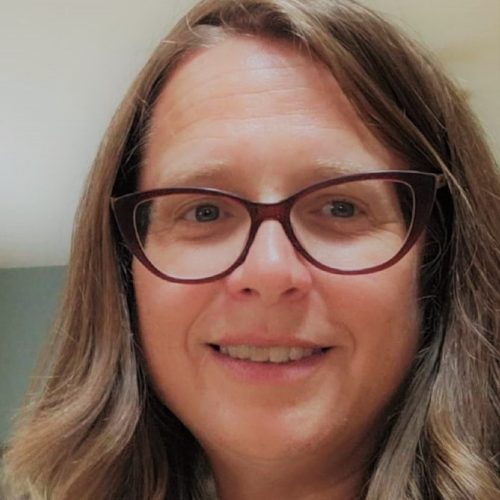
Shawna LaRade, Director
Cranbrook
Shawna LaRade is a multi-faceted professional with a career in Range Management. Shawna is the Range Stewardship Officer for the Province of British Columbia and brings a background in governance and range science.
Shawna and her family live in the East Kootenay area on the traditional territory of the Ktunaxa and Secwepemc peoples. Shawna has a Master of Science in Range and Wildlife Resources from the University of Alberta. With a career spanning over two decades, Shawna has dedicated her efforts on building relationships, maintaining, and enhancing ecosystem health and managing grasslands and ecosystems for diverse values and integrated use. She has worked in Range Management for the past 16 years where she has led and supported a diversity of projects and initiatives focused on ecosystem health.
Shawna looks forward to working with the board and members of the Grasslands Conservation Council for the wise stewardship of BC’s grasslands.
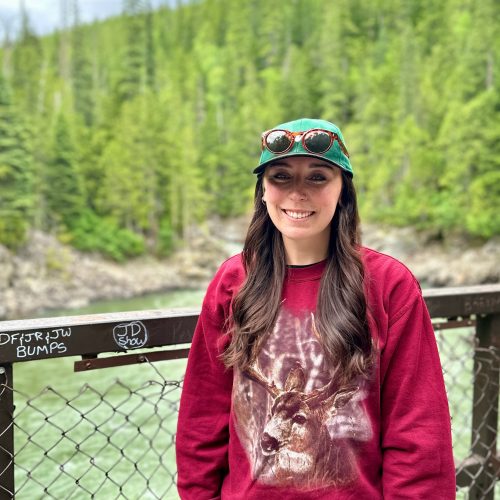
Meghan Allan, Director
Kamloops
Meghan is from Kamloops, BC, but spent a lot of her time throughout Savona and Skeetchestn as her Dad and family grew up on a ranch in Deadman’s Creek. Exploring these beautiful landscapes really developed a deep passion for grassland landscapes and wildlife, which led her to pursue an undergraduate degree with a Bachelor of Natural Resource Science from Thompson Rivers University.
Throughout her undergrad, she worked as a wildlife technician at Skeetchestn Natural Resources Corporation, where she worked with various projects on wildlife and habitat management including grasslands and species at risk, and culturally significant plants. Through this work she wrote her undergraduate research paper on “Plant Community Response Postfire and its influence on California Bighorn Sheep Forage.”
Meghan is currently a technical coordinator- cultural heritage specialist with the Citxw Nlaka’pamux Assembly (CNA), where she provides support in the maintenance of the relationship between CNA and the Cultural Heritage team at Highland Valley Copper and provides technical review services to the 8 Nlaka’pamux Bands regarding Environmental Management, Cultural Heritage, Regulatory Engagement, Mine Closure and Reclamation, Tailings, Wildlife Health and Stewardship, and Environmental Assessment.

Hellen Bayliff, Director
Redstone
Hellen operates Chilancoh Ranch in the Chilcotin with her 2 kids, the 5th generation, and her sister-in-law. They manage adaptively with a focus on grazing to improve their soils, forage, and ecological functioning. Healthy grasslands and wetlands are the foundation of the health of the ranch, and is demonstrated by the diversity and population of wildlife supported by the ranch, including this spring, over 70 species of birds identified.
Regenerative ranching is Hellen’s passion and she has been closely observing their deeded and range lands for over 25 years. Watching the devastating impacts of climate change on the ranch with long droughts, massive wildfires, flooding, and extreme weather events, caused her to obtain a Masters of Environment and Management from Royal Roads University’s School of Environment and Sustainability in order to understand the larger picture better. Hellen understands the vulnerabilities of ranching as the same as the vulnerabilities and threats to grasslands, and hopes to improve the situation of both through management and public education at both the very local level and the larger landscape level.
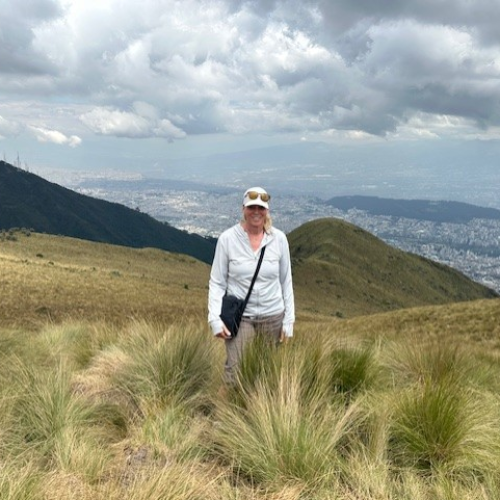
Dr. Wendy Gardner, Director
Kamloops
Wendy Gardner is professor in the Natural Resource Science Department at Thompson Rivers University, where she teaches courses in grassland ecology, range management, and ecosystem restoration.
Wendy is also an active member of the Society for Range Management and is a registered as a Professional Agrologist. She is a long-time member of the Grasslands Conservation Council and has served on the board in the past.
She is passionate about grasslands and have dedicated much of her career to researching and understanding these unique ecosystems. As an outdoor enthusiast, she values the connection between people and landscapes and works to promote the conservation and sustainable management of grasslands.
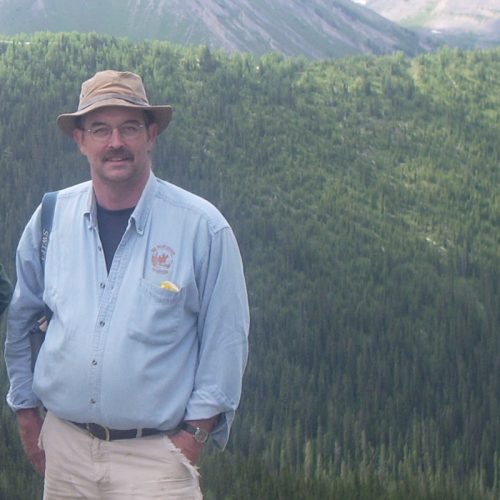
Lindsay Jones, Director
Victoria
Lindsay enjoyed a 40-year career with non- profit conservation groups, senior roles within the BC government, and the international energy business.
Retiring in 2023, Lindsay has developed and implemented coastal wetland acquisition, management and rehabilitation projects and programs with groups such as the Nature Trust of BC and Ducks Unlimited Canada; the resolution of complex provincial land use planning issues in Clayoquot Sound and the Great Bear Rainforest as well as land use reconciliation agreements with coastal First Nation communities including the Haida and Central Coast First Nations.
His international work focused on a large energy (LNG) export proposal for the North Coast.
Lindsay’s interest in the grasslands of BC stems from his boyhood experiences hiking the sagebrush hills above Kamloops and his 50 year relationship with the landscapes of the West Chilcotin.
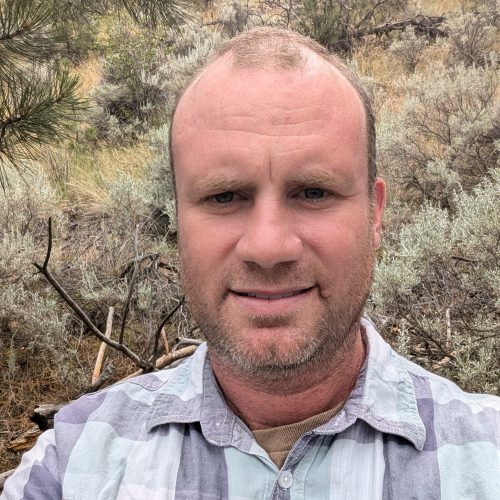
Allen Wootton, Director
Kamloops
Allen is a Regional Coordinator at the BC Conservation Foundation in Kamloops, responsible for fish, wildlife and ecosystem conservation projects in the Thompson-Okanagan regions.
Allen has a PhD in wildlife ecology and his past experiences and interests have included habitat and food resource ecology, species at risk, protected areas and spatial analysis monitoring in British Columbia, Mexico and Australia. His current passion is to create more local conservation projects and habitat conservation work opportunities in BC’s dry interior.
His favorite time of the year in the grasslands is late summer when the grasses turn golden, the rabbitbrush blooms and pelicans come to Kamloops Lake.

Mike Dedels, Executive Director
Kamloops
Mike was inspired to go into the Range Program at UBC as grazing is one of the few ways we produce food from intact ecosystems. After six years in wholesale and retail sales he started with the Ministry of Forests in the Range Program in 1990 and worked for the Provincial government in a number of roles until 2018. He enjoyed the opportunity to work with many leaders in Range Management in government and on the land, and developed a love for the grasslands. Mike then had four years working on invasive plants with the TNRD, including leading a major prevention and control program in the Elephant Hill wildfire area.
Mike is a long time GCC member, including eight years on the Board, with terms as Secretary and Treasurer. He has been under contract as GCC Executive Director since July 2022.
Mike has a passion for increasing knowledge of grasslands through outreach to the general public, and collaboration with First Nations, landowners and other NGOs.
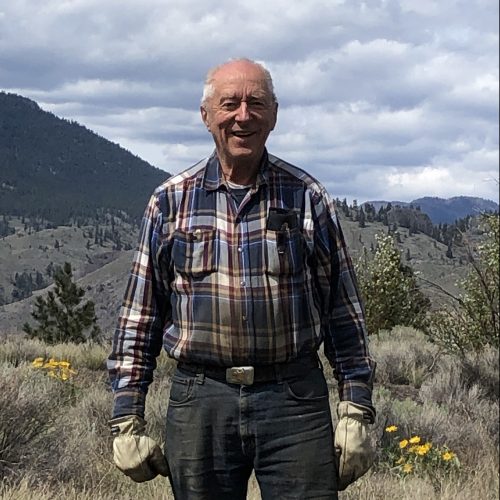
Bob Haywood-Farmer, Past Chair
Savona
Bob Haywood-Farmer and his cousin own and operate Indian Gardens Ranch, a cattle ranch in the Thompson Nicola Region. His family has been ranching in Savona, BC for almost 100 years; the fourth generation will be keeping it in the family when Bob is ready to retire.
Bob is a member of the Interior Panel for the Agriculture Land Commission, the BC Cattlemen’s Association, and the BC Livestock Association. He represents the BCCA on the Canadian Intermountain Venture, bringing an important voice to the organization’s projects.
The late Dr. Bert Brink, conservationist and UBC professor, is credited with Bob’s passion for preserving this threatened ecosystem. “Dr. Brink was so enthusiastic and knowledgeable about BC grasslands,” stated Bob, “that it was hard not to be interested.” He is dismayed with the many pressures driving the loss of grasslands. These threats include the fracturing of large lots into small holdings that result in a “mosaic of hobby farms”; and the lack of species diversity when clear-cut areas are re-vegetated.
Bob’s work as a director of GCC will include an emphasis on public engagement and education, as he feels policy change begins on the ground.
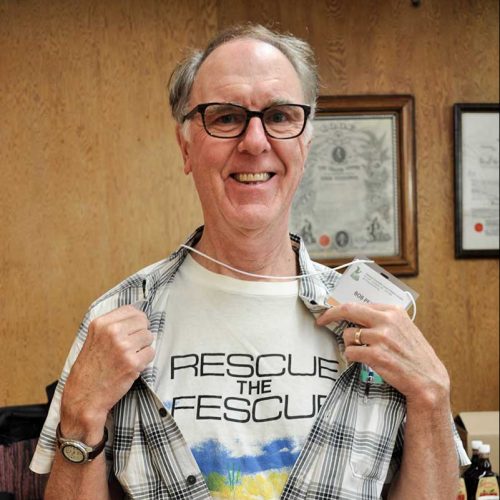
Bob Peart, Honorary Board Member
Victoria
Bob has been a biologist and environmental educator for nearly 40 years, living in Victoria since the early 1980s.
After working in a variety of senior roles in government and environmental organizations, he is currently semi-retired/self-employed.
Bob has been involved in temperate grassland related issues since the mid-70s, and has worked to protect and conserve them at the international, national, provincial, and regional levels.
As the Founding Chair of the GCC, Bob has been a strong voice for keeping working ranches working, and for keeping the remaining BC grasslands ecologically intact.

